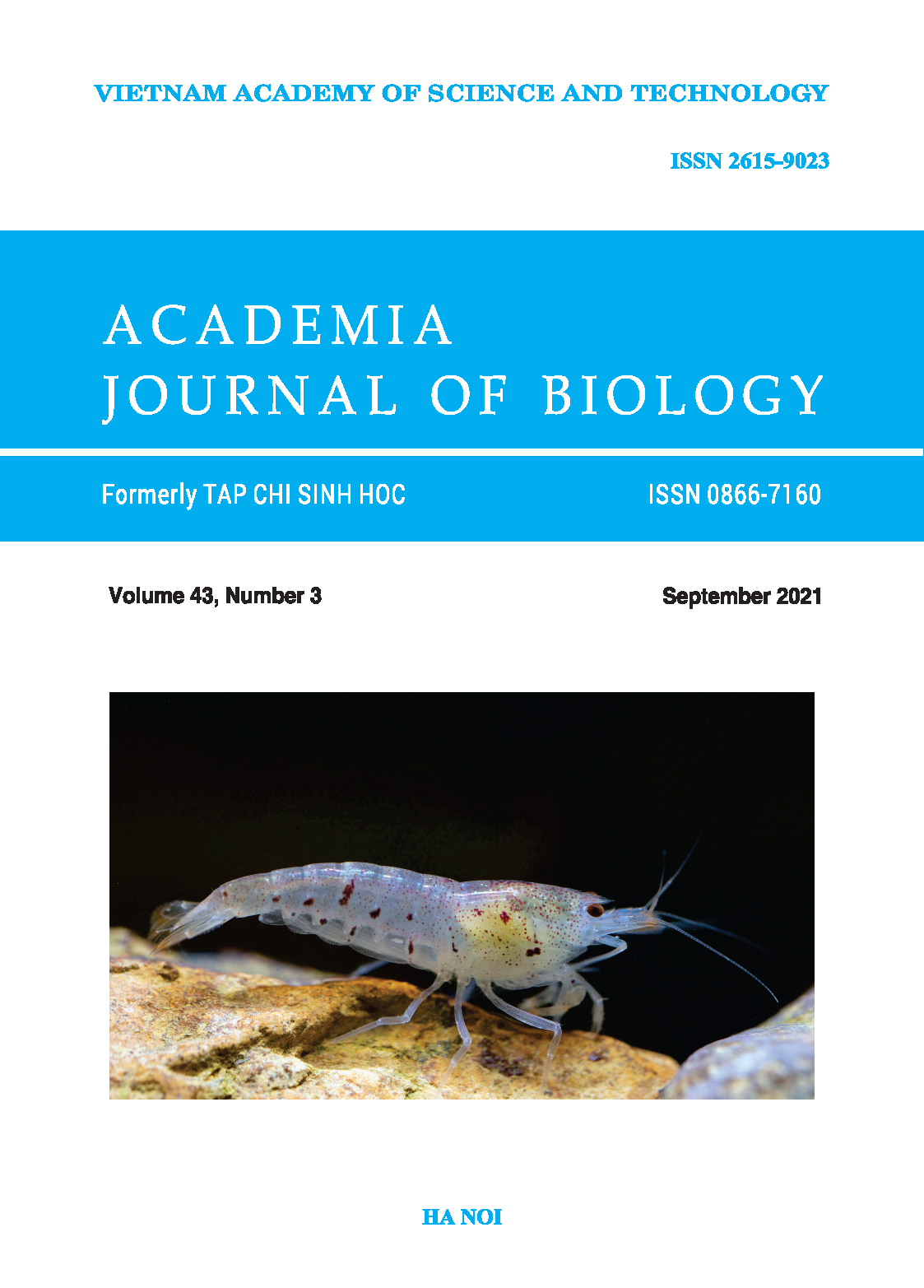\(\textit{In vitro}\) antioxidant, α-amylase and α-glucosidase inhibitory activities of endophytic bacteria from the roots of the mangrove plant \(\textit{Rhizophora stylosa}\) Griffith
Author affiliations
DOI:
https://doi.org/10.15625/2615-9023/16143Abstract
Mangrove is one of the highly productive ecosystems and contains diverse plants and microbial communities. Bacterial endophytes from mangroves are considered as a prolific source of biological molecules with important functions in the protection of mangrove plants against herbivores, insects as well as pathogens. The present study aimed to isolate endophytic bacteria from the roots of mangrove plant Rhizophora stylosa and to screen antioxidant,
Downloads
References
Ancheeva E., Daletos G., Proksch P., 2018. Lead compounds from mangrove-associated microorganisms. Mar. Drugs, 16: 319. https://doi.org/10.3390/ md16090319
Chakrabarti R., Rajagopalan R., 2002. Diabetes and insulin resistance associated disorders: Disease and the therapy. Curr. Sci., 83(12): 1533–1538. https://www.jstor.org/stable/24108177
Dat T. T. H., Oanh P. T. T., Tam V. T. T., Anh H. L. T., 2019a. Antimicrobial activity of bacteria isolated from the coastal mangrove sediment in Thua Thien Hue. Proceedings of National Scientific Forum 2019: Marine Biology and Sustainable Development: 971–980. Publishing House of Natural Science and Technology, Hanoi, Vietnam.
Dat T. T. H., Oanh P. T. T., Tam V. T. T., Anh H. L. T., 2019b. Antimicrobial and antioxidant activity of bacterial endophytes isolated from leaves of the mangrove plant Rhizophora stylosa. Acad. J. Biol., 41(4): 91–99. https://doi.org/10.15625/0866-7160/v4 1n4.14675
Giacco F., Brownlee M., 2010. Oxidative stress and diabetic complications. Circ. Res., 107(9): 1058–1070. https://doi.org/ 10.1161/CIRCRESAHA.110.223545
Guo W., Kong X., Zhu T., Gu Q., Li D., 2015. Penipyrols A-B and peniamidones A-D from the mangrove Derived Penicilli. Arch. Pharm. Res., 38(8): 1449–1454. https://doi.org/10.1007/s12272-014-05 13-3
He F., Li X., Yu J. H., Zhang X., Nong X., Chen G., Zhu K., Wang Y. Y., Bao J., Zhang H., 2019. Secondary metabolites from the mangrove sediment-derived fungus Penicillium pinophilum SCAU037. Fitoterapia, 136: 104177. https://doi.org/10.1016/j.fitote.2019.104177
Hong H. T., Phuong N. N., 2013. The isolation and selection of actinomycete species from Can Gio tropical swamp for their antifungal feature against Fusarium sp. J. Sci., Ho Chi Minh City University of Education, 51: 59–71.
Kui-Wu W., Shi-Wei W., Bin W., Ji-Guang W., 2014. Bioactive natural compounds from the mangrove endophytic fungi. Mini-Rev. Med. Chem., 14: 370–391. https://doi.org/10.2174/1389557514666140220122829
Lopéz D., Cherigo L., Mejia L. C., Loza-Mejía M. A., Martínez-Luis S., 2019. α-Glucosidase inhibitors from a mangrove associated fungus, Zasmidium sp. strain EM5-10. BMC Chem., 13(1): 22. https://doi.org/10.1186/s13065-019-054 0-8
Maiese K., 2015. New insights for oxidative stress and diabetes mellitus. Oxid. Med. Cell. Longev., 2015: 875961. https://doi.org/10.1155/2015/875961
Manganyi M. C., Tchatchouang C. D. K., Regnier T., Bezuidenhout C. C., Ateba C.N., 2019. Bioactive compound produced by endophytic fungi isolated from Pelargonium sidoides against selected bacteria of clinical importance. Mycobiology, 47: 335–339. https://doi.org/10.1080/12298093.2019.1631121
Neha K., Haider M. R., Pathak A., Yar M. S., 2019. Medicinal prospects of antioxidants: A review. Eur. J. Med. Chem., 178: 687–704. https://doi.org/ 10.1016/j.ejmech.2019.06.010
Oguntibeju O. O., 2019. Type 2 diabetes mellitus, oxidative stress and inflammation: examining the links. Int. J. Physiol. Pathophysiol. Pharmacol., 11(3): 45–63.
Pizzino G., Irrera N., Cucinotta M., Pallio G., Mannino F., Arcoraci V., Squadrito F., Altavilla D., Bitto A., 2017. Oxidative stress: harms and benefits for human health. Oxid. Med. Cell. Longev., 2017: 8416763. https://doi.org/10.1155/2017/ 8416763
Pujiyanto S., Resdiani M., Raharja B., Ferniah R. S., 2018. α-Amylase inhibitor activity of endophytic bacteria isolated from Annona muricata L. J. Phys.: Conf. Ser., 1025: 012085. https://doi.org/10.1088/ 1742-6596/1025/1/012085
Qiu P., Liu Z., Chen Y., Cai R., Chen G., She Z., 2019. Secondary metabolites with α-glucosidase inhibitory activity from the mangrove fungus Mycosphaerella sp. SYSU-DZG01. Mar. Drugs, 17(8): 483. https://doi.org/10.3390/md17080483
Rahmawati S. I., Izzati F. N., Hapsari Y., Septiana E., Rachman F., Bustanussalam, Simanjuntak P., 2019. Endophytic microbes and antioxidant activities of secondary metabolites from
mangroves Avicennia marina and Xylocarpus granatum. IOP Conf. Ser.: Earth Environ. Sci., 278: 012065. https://doi.org/10.1088/1755-1315/278/ 1/012065
Subramanian R., Asmawi M. Z., Sadikun A., 2008. In vitro alpha-glucosidase and alpha-amylase enzyme inhibitory effects of Andrographis paniculata extract and andrographolide. Acta. Biochim. Pol., 55(2): 391–398.
Thatoi H., Behera B. C., Mishra R. R., Dutta S. K., 2013. Biodiversity and biotechnological potential of microorganisms from mangrove ecosystems: a review. Ann. Microbiol., 63: 1–19. https://doi.org/10.1007/ s13213-012-0442-7
Xu J., 2015. Bioactive natural products derived from mangrove-associated microbes. RSC Adv., 5: 841–892. https://doi.org/10.1039/C4RA11756E
Zhou J., Diao X., Wang T., Chen G., Lin Q., Yang X., Xu J., 2018. Phylogenetic diversity and antioxidant activities of culturable fungal endophytes associated with the mangrove species Rhizophora stylosa and R. mucronata in the South China Sea. PloS one, 13: e0197359. https://doi.org/10.1371/journal.pone.0197359
Downloads
Published
How to Cite
Issue
Section
License
Academia Journal of Biology (AJB) is an open-access and peer-reviewed journal. The articles published in the AJB are licensed under a Creative Commons Attribution-NonCommercial-NoDerivatives 4.0 International License (CC BY-NC-ND 4.0), which permits for immediate free access to the articles to read, download, copy, non-commercial use, distribution and reproduction in any medium, provided the work is properly cited (with a link to the formal publication through the relevant DOI), and without subscription charges or registration barriers. The full details of the CC BY-NC-ND 4.0 License are available at https://creativecommons.org/licenses/by-nc-nd/4.0/.












